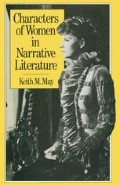Abstract
The attitudes towards women of the three novelists with whom we shall be most concerned in this chapter may usefully be summarized at the outset. Defoe thought that men and women were alike, except that women had livelier minds and potentially better abilities. Richardson also regarded men and women as ‘brothers and sisters’, as he put it, akin but for circumstances and education. He however relished certain social and sexual roles which through his genius he so powerfully reinforced that the results of his influence can be felt to the present day. Fielding’s attitude might be described as one of disappointed chivalry. He seems to have believed that men should be able to look to women for moral guidance, but that they rarely could because many women either aped men or exploited their own positions for selfish purposes.
Access this chapter
Tax calculation will be finalised at checkout
Purchases are for personal use only
Preview
Unable to display preview. Download preview PDF.
Notes and References
See James T. Boulton (ed.), Daniel Defoe (Batsford, 1965) p. 32. Compare Dr Johnson’s remark: ‘Men know that women are an overmatch for them, and therefore they choose the weakest or most ignorant. If they did not think so, they could never be afraid of women knowing as much as themselves.’ R. W. Chapman (ed.), Johnson’s Journey to the Western Islands of Scotland and Boswell’s Journal of a Tour to the Hebrides with Samuel Johnson LLD (Oxford University Press, 1970) p. 311.
Ian Watt, The Rise of the Novel (Chatto & Windus, 1957) p. 115.
Daniel Defoe, Moll Flanders (Oxford University Press, 1971) pp. 273f.
Daniel Defoe, Roxana, the Fortunate Mistress (Oxford University Press, 1964) pp. 147f.
Samuel Richardson, Sir Charles Grandison (Oxford University Press, 1972) vol. 1, letter 37, p. 189.
Quoted in Morris Golden, Richardson’s Characters (Ann Arbor: University of Michigan Press, 1963) p. 3.
Quoted in T. Duncan Eaves and Ben D. Kimpel, Samuel Richardson: A Biography (Oxford University Press, 1971) p. 200.
Samuel Richardson, Pamela (Everyman Edition, J. M. Dent, 1974) vol. 1, letter 8.
Samuel Richardson, Clarissa (Everyman Edition, J. M. Dent, 1968) vol. 2, letter 37, p. 134. Richardson’s attitude to power is convincingly analysed in Morris Golden’s Richardson’s Characters.
Henry Fielding, The History of Tom Jones (Everyman Edition, J. M. Dent, 1962) bk XVIII, ch. 12.
Henry Fielding, Amelia (Everyman Edition, J. M. Dent, 1959) bk IX, ch. 5.
Copyright information
© 1981 Keith M. May
About this chapter
Cite this chapter
May, K.M. (1981). The Eighteenth Century. In: Characters of Women in Narrative Literature. Palgrave Macmillan, London. https://doi.org/10.1007/978-1-349-16626-8_2
Download citation
DOI: https://doi.org/10.1007/978-1-349-16626-8_2
Publisher Name: Palgrave Macmillan, London
Print ISBN: 978-1-349-16628-2
Online ISBN: 978-1-349-16626-8
eBook Packages: Palgrave Literature & Performing Arts CollectionLiterature, Cultural and Media Studies (R0)

